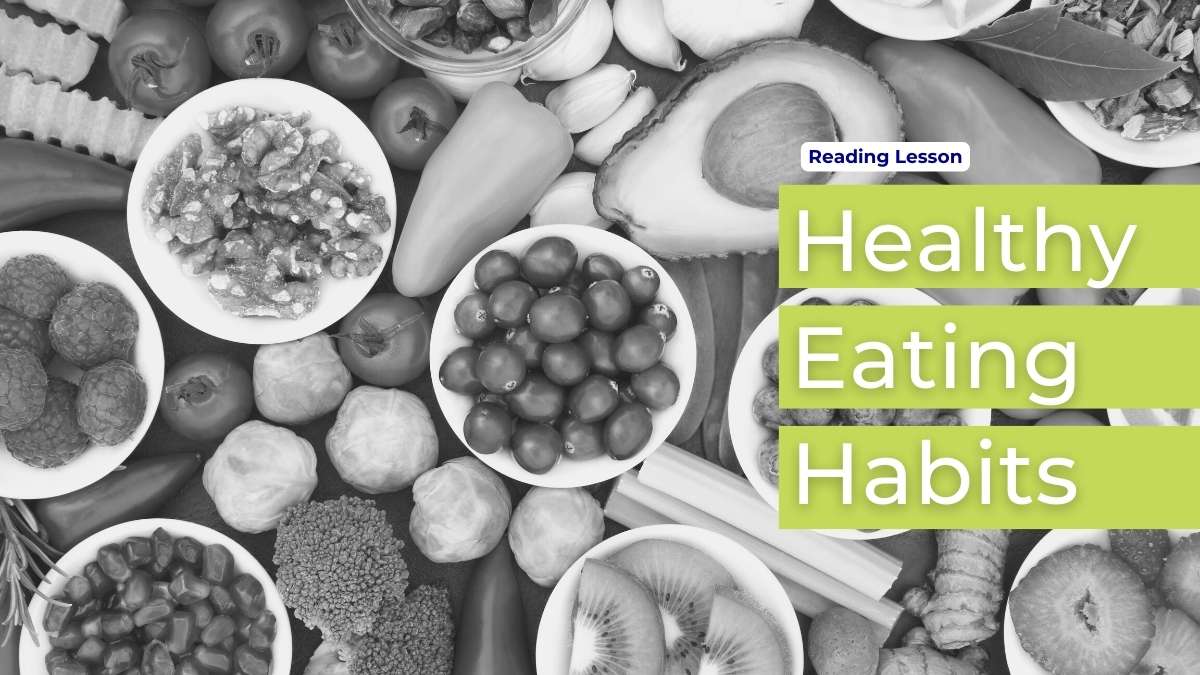Reading lesson: Healthy Eating Habits

Read the article about people’s food choices during the COVID pandemic. You can also listen along with the audio recording.
Healthier Eating Reported During Coronavirus
People in some countries have reported making healthier eating choices during the coronavirus crisis. New research also found that people facing stay-at-home orders tried cooking new things and threw away less food. The results came from a recent research project involving 11,000 shoppers in 11 countries.
A lead organizer of the study was Charlotte De Backer, a researcher at the University of Antwerp in Belgium. She told Reuters news agency the results showed that people were buying less microwaveable food and more fresh fruits and vegetables.
Muriel Bernard is the founder of Belgium-based organic food online seller eFarmz. She told Reuters she had to nearly double her workforce to 25 to meet demand for her fresh products.
The first part of the study involved shoppers in several European countries, as well as Australia, Chile, Uganda, Canada and Brazil. More than half of those taking part were in Belgium. The research will next be expanded to include 25 additional countries, with final results expected by the end of June.
In nearly half of the countries, shoppers reported buying fewer salty or sweet snacks, although overall sales remained about the same.
De Backer said many people turn to salty, sweet and fatty products when they are feeling stress. But during the current crisis, many people seemed to fill this desire with home-baked goods.
In Chile, for example, there was a large drop in sales of snacks, but a big rise in people buying baking necessities like flour.
Consumption of meat, fish and alcoholic drinks generally remained the same, the research showed.
De Backer said the healthier food buying could be related to the fact that people took more time to carefully plan their trips to the store. “If you make a shopping list, you plan your meals ahead and you are less likely to add unhealthy food.”
Many shoppers taking part in the study also said they had tried cooking new things and used more left-over foods to reduce waste. However, De Backer said this behavior could be linked to fears of food shortages and could change after the crisis.
But she noted that some of the improvements in eating are likely to continue. She says this is because in many countries, stay-at-home orders have been in place for more than six weeks – the usual amount of time it takes people to form new behaviors.
De Backer also said that as people grow more confident and creative in the kitchen, they could break down one of the main barriers to home cooking.
Reuters reported on this story. Bryan Lynn adapted the report for VOA Learning English. Hai Do was the editor.
Writing Exercise
Reading Comprehension Quiz
Quiz Summary
0 of 10 Questions completed
Questions:
Information
You have already completed the quiz before. Hence you can not start it again.
Quiz is loading…
You must sign in or sign up to start the quiz.
You must first complete the following:
Results
Results
0 of 10 Questions answered correctly
Your time:
Time has elapsed
You have reached 0 of 0 point(s), (0)
Earned Point(s): 0 of 0, (0)
0 Essay(s) Pending (Possible Point(s): 0)
Categories
- reading 0%
- 1
- 2
- 3
- 4
- 5
- 6
- 7
- 8
- 9
- 10
- Current
- Review
- Answered
- Correct
- Incorrect
-
Question 1 of 10
1. Question
Complete the sentence with the missing word according to the text:
In about half of the studied countries, people were eating fewer __________ between meals.CorrectIncorrect -
-
Question 2 of 10
2. Question
Choose the correct option to complete the sentence:
It takes ______________ to form a new habit, according to the text.CorrectIncorrect -
Question 3 of 10
3. Question
Complete the sentence with the missing word according to the text:
Many people from __________ bought more baking necessities like flour during lockdowns.CorrectIncorrect -
-
Question 4 of 10
4. Question
What does microwaveable mean?
CorrectIncorrect -
Question 5 of 10
5. Question
What is an example of a food shortage?
CorrectIncorrect -
Question 6 of 10
6. Question
True or false, according to the text:
People in lockdown bought more food because there was not enough food in stores.CorrectIncorrect -
Question 7 of 10
7. Question
What does workforce mean?
CorrectIncorrect -
Question 8 of 10
8. Question
What are some of the reasons that people eat unhealthy foods (according to the text)?
Select all that are correct.CorrectIncorrect -
Question 9 of 10
9. Question
Complete the sentence with the missing word according to the text:
Food produced without the use of chemicals is called __________ food.CorrectIncorrect -
-
Question 10 of 10
10. Question
Which of the following statements are true according to the text?
CorrectIncorrect
